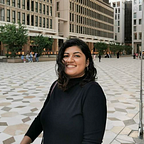Is Contouring un-Feminist?
Makeup has been empowering for me. Especially with the rise of feminist brands like Fenty Beauty by pop singer Rihanna, women of colour can experiment unabashedly with makeup. Your face is a canvas, and you can paint art on it without worrying if it is the “right-size” or not. As a plus-size woman, I truly believe that makeup is for everyone. I have never had to “fit in” to makeup. In retrospect, this is what made me so excited to keep experimenting with it since the 7th grade. But is wearing makeup truly the liberation of the modern-day feminist? This blog post discusses some overlooked aspects in which the interpretation of makeup can be un-feminist.
There is an aspect that is not inclusive to a large extent. Indulging in fashion is a privilege that women of a lower socioeconomic status do not have. Although for many women, in some way or another, makeup is a necessity which is why makeup was invented thousands of years ago. If the Egyptians would’ve known that the Kohl they invented would’ve been commercialized into a billion-dollar industry, they would’ve invented copyright as well!
When it was invented, it was used by both men and women. This mirrors present times when Instagram has provided a platform for men to wear makeup, although society outside is not as accepting.
Talking about makeup being inaccessible to a sect of society is pretty common. Analysing the commercialization of makeup, the purpose of certain products capitalizes on the insecurity of the wearer. For example, everybody knows concealer is used for hiding acne, dark circles, hangovers, and bad decisions (as Queen RiRi said in her vogue tutorial). On the other hand, certain eyeliner techniques are used to give an illusion of larger eyes. While makeup empowers a lot of women, the reasoning behind each of these products, in a makeup routine, has been questioned much lesser. This may stem from fear of division within the beauty community while existing backlash from men and society at large already exists towards women who wear makeup. Society demanding that good women wear minimal makeup and still look “pretty” might be the reason behind the so-called “no-makeup makeup” look perhaps?
While I enjoy looking like my jawline can cut glass (almost) after contouring, I am well aware that this is the result after years of society telling me that this is the only way a woman can look pretty (read: perfect). Here, perfect means looking as though one constantly has a filter on. The effect of filters in social media, calls for another blog.
Contour has also been advertised into adding dimension onto the face, after painting it with foundation. It is used to give an effect of a more “in shape” face. Although, makeup and fashion trends which give an illusion of an “in shape” body has been overdone by the likes of celebrities like Kim Kardashian. She has changed the contour game along with her MUA Mario. Even lip contours have started coming out, giving an illusion of “fuller lips”. The line between makeup being an art, and also a tool to capitalize on the insecurities of women has blurred during the ongoing Instagram generation.
Acknowledging the boons are important, whilst not ignoring the banes of an industry whose sole purpose is outer beauty. Since even such supposedly minute details have long-term repercussions on the self-respect and mental health of people. I wanted to end with two questions, we might need to introspect on, especially in today’s age. Is the shade ‘nude’ a result of systemic racism? (Read: a report by theguardian.com) What talks can we start up more to make the beauty industry more inclusive?
